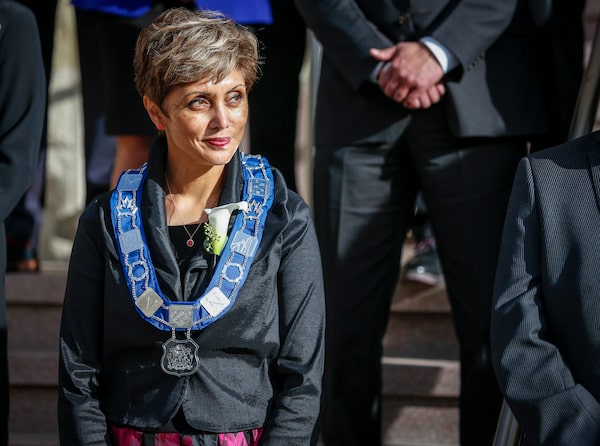
Jyoti Gondek wears her chain of office after being sworn-in as the new mayor of Calgary in Calgary, Alta., on Oct. 25. Ms. Gondek was born in England to parents of Punjabi descent and came to this country as a child.Jeff McIntosh/The Canadian Press
This is not a story about race.
But to understand how it isn’t, we have to talk about how, in another, less successful country, it could be.
In 2016, the census found that 31 per cent the residents of the City of Calgary were immigrants. Thirty-six per cent of the population were members of a visible minority, including 9.5 per cent who were South Asian. The picture is almost exactly the same in Edmonton: 30 per cent of residents are immigrants and 37 per cent are visible minorities, including 9.5 per cent who identify as South Asian.
Two weeks ago, the people of Edmonton and Calgary went to the polls and elected new mayors. Both were born outside of Canada. Jyoti Gondek, Calgary’s top magistrate, was born in England to parents of Punjabi descent and came to this country as a child; Edmonton’s Amarjeet Sohi was born in India and immigrated in his teens. On the census, both would be counted among the roughly one in 10 city residents of South Asian descent.
Alberta’s civic elections strike another blow to lazy stereotypes about the province
‘Climate emergency’ is a nuts-and-bolts issue for Calgary’s new mayor
We bring up race not because it was an issue in the elections of Ms. Gondek and Mr. Sohi, but because it was not. And let us give thanks for that.
In many other countries – less happy, less peaceful countries – the story would have been very different. There, race, religion or ethnicity are the basis for politics. Sectarian divides slice through the possibility of shared citizenship, with lives and politics organized along those lines.
That’s how much of the world is. (Ask an immigrant.) In the worst cases, it results in the failed state of Lebanon, or the violently extinguished state of Yugoslavia, or the Rwanda genocide.
But here’s what we believe can safely be said about the mayoral elections in Calgary and Edmonton: The race of the candidates, their religion (or lack thereof), and their status as first-generation Canadians appear to have been irrelevant to most voters. Maybe not all voters, whether pro or con, but surely most.
Consider: Nine out of 10 voters in Calgary and Edmonton are not of South Asian heritage. Yet Ms. Gondek and Mr. Sohi each won 45 per cent of the vote. That means that most of those who voted for them were from “another” community.

Edmonton Mayor Amarjeet Sohi at his swearing-in ceremony on Oct. 26. Mr. Sohi was born in India and immigrated in his teens.JASON FRANSON/The Canadian Press
And we put the word “another” in quotation marks because, this being Canada in 2021, most voters don’t see it that way. They weren’t marking their ballots through a prism of race. They didn’t see the winning candidates as coming from some other community, but rather as part of their shared community – Calgarian, Edmontonian, Albertan, Canadian – that transcends where you or your parents came from, where you pray or do not pray, and what colour your skin is.
Canadians are not saints, and Canada is not some magic land where racism never existed. It is not some place where no lines have ever been drawn labelling some people as “us” and others as “them.” Canada has a long history of evolving varieties of sectarian divisions.
But Canada also has a long and accelerating history of expanding the definition of “us,” and extending membership in the shared community to people who, in another place or another time, might have been excluded. For example, until 1954, the mayor of Toronto had always been a Protestant from the Orange Order. But that year, the citizens of Toronto ended all that, electing Nathan Phillips. Phillips was Jewish; nearly all of the city’s residents were not. Most were Protestants. It didn’t matter.
It was a similar story half a century later, in the three mayoral elections won by Naheed Nenshi in Calgary. The vast majority of the people of Calgary are not Ismaili Muslims; it didn’t matter. Overwhelming majorities chose Mr. Nenshi as their representative. And though three-quarters of the residents of Brampton, Ont., are visible minorities, in 2018 they elected Patrick Brown as mayor.
This ability to see beyond differences and biology and faith is something that Canada will need ever more of in its future. Canada is on the road to becoming a majority-minority nation, where no ethnic or racial group is the majority. That’s already the situation in Metro Vancouver and Greater Toronto, and the other big cities are not far behind.
The voting in Calgary and Edmonton is a reminder that this future is hopeful, not ominous. If a Canadian is defined by all that we hold in common, in spite of differences, then everybody’s part of the majority.
Keep your Opinions sharp and informed. Get the Opinion newsletter. Sign up today.